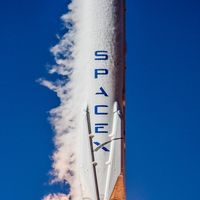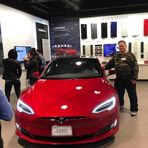California's EV Tax Credit Dilemma: A Shifting Landscape for Tesla
November 27, 2024, 9:35 pm

Location: United States, District of Columbia, Washington
Employees: 5001-10000
Founded date: 2002
Total raised: $7.53B

Location: United States, Texas, Austin
Employees: 10001+
Founded date: 2003
Total raised: $3.86B
California is at a crossroads. The state, known for its ambitious environmental policies, is now facing a conundrum that could reshape the electric vehicle (EV) market. A new proposal threatens to exclude Tesla from state tax credits, igniting a firestorm of controversy. This move comes amid discussions about federal EV tax credits, which could be scrapped under the incoming Trump administration. The stakes are high, and the implications are profound.
Tesla, once the darling of California's green revolution, is now caught in a political crossfire. The company's recent relocation to Texas has raised eyebrows. Elon Musk, the face of Tesla, has been vocal about his discontent with California's regulatory environment. His criticisms have not gone unnoticed. The governor's office is now considering a new Clean Vehicle Rebate Program, but the details remain murky.
The proposed changes could mean that Tesla vehicles, which are manufactured in California, would not qualify for state tax credits. This is a bitter pill for Musk, who has championed the state's EV initiatives. The irony is palpable. Tesla, a pioneer in the EV space, could be sidelined in its home state.
The backdrop to this drama is the potential elimination of the federal EV tax credit. The Trump administration's transition team is reportedly weighing the option to scrap the $7,500 incentive for EV purchases. If this happens, California's governor, Gavin Newsom, has indicated he will push for a new state-level rebate program. However, the details are still in flux, and negotiations with the legislature will be crucial.
California has long been a leader in the push for zero-emission vehicles. The state recently celebrated a milestone: over 2 million zero-emission vehicles sold. This achievement reflects a growing commitment to sustainable transportation. Yet, the proposed changes to tax credits could stifle this momentum. If Tesla is excluded, it could create a ripple effect, impacting sales and innovation.
Musk's relationship with California has been tumultuous. He has clashed with state officials over various issues, including pandemic-related factory shutdowns and social policies. His decision to move Tesla's headquarters to Texas was a clear signal of his frustration. Now, as the state navigates its EV tax credit landscape, Musk's influence looms large.
The proposed tax credit changes are not just about Tesla. They represent a broader struggle between innovation and regulation. California's ambitious goals for electric vehicles require a delicate balance. The state aims for 80% of new vehicle sales to be electric by 2035. However, excluding a major player like Tesla could hinder progress.
The potential for a new Clean Vehicle Rebate Program raises questions about market competition. Newsom's office has hinted at a cap on rebates to encourage innovation and support new entrants. This could open the door for other manufacturers but might also alienate Tesla, which has been a significant contributor to California's EV landscape.
The stakes are high for consumers as well. EV buyers in California have benefited from generous tax credits, making electric vehicles more accessible. If Tesla is excluded from these incentives, it could lead to higher prices for consumers. The ripple effects could extend beyond Tesla, impacting the entire EV market in California.
The environmental implications are equally significant. California has set ambitious targets to reduce greenhouse gas emissions. The state aims to halt the sale of gasoline-only vehicles by 2035. This plan has garnered skepticism from major automakers, but California remains steadfast. The proposed tax credit changes could either bolster or undermine these efforts.
As the dust settles, one thing is clear: California's EV landscape is evolving. The state is grappling with the complexities of innovation, regulation, and market dynamics. Tesla's future in California hangs in the balance, and the outcome will shape the trajectory of electric vehicles in the state.
In the coming months, all eyes will be on California. The decisions made here will resonate far beyond its borders. The state has the potential to lead the charge in sustainable transportation, but it must navigate the challenges ahead with care. The future of Tesla, and the broader EV market, depends on it.
In conclusion, California's EV tax credit dilemma is a microcosm of a larger battle between innovation and regulation. As the state seeks to maintain its leadership in the EV space, it must consider the implications of its decisions. The exclusion of Tesla from tax credits could have far-reaching consequences, not just for the company, but for the entire electric vehicle ecosystem. The road ahead is uncertain, but one thing is clear: California's commitment to a sustainable future is being tested like never before.
Tesla, once the darling of California's green revolution, is now caught in a political crossfire. The company's recent relocation to Texas has raised eyebrows. Elon Musk, the face of Tesla, has been vocal about his discontent with California's regulatory environment. His criticisms have not gone unnoticed. The governor's office is now considering a new Clean Vehicle Rebate Program, but the details remain murky.
The proposed changes could mean that Tesla vehicles, which are manufactured in California, would not qualify for state tax credits. This is a bitter pill for Musk, who has championed the state's EV initiatives. The irony is palpable. Tesla, a pioneer in the EV space, could be sidelined in its home state.
The backdrop to this drama is the potential elimination of the federal EV tax credit. The Trump administration's transition team is reportedly weighing the option to scrap the $7,500 incentive for EV purchases. If this happens, California's governor, Gavin Newsom, has indicated he will push for a new state-level rebate program. However, the details are still in flux, and negotiations with the legislature will be crucial.
California has long been a leader in the push for zero-emission vehicles. The state recently celebrated a milestone: over 2 million zero-emission vehicles sold. This achievement reflects a growing commitment to sustainable transportation. Yet, the proposed changes to tax credits could stifle this momentum. If Tesla is excluded, it could create a ripple effect, impacting sales and innovation.
Musk's relationship with California has been tumultuous. He has clashed with state officials over various issues, including pandemic-related factory shutdowns and social policies. His decision to move Tesla's headquarters to Texas was a clear signal of his frustration. Now, as the state navigates its EV tax credit landscape, Musk's influence looms large.
The proposed tax credit changes are not just about Tesla. They represent a broader struggle between innovation and regulation. California's ambitious goals for electric vehicles require a delicate balance. The state aims for 80% of new vehicle sales to be electric by 2035. However, excluding a major player like Tesla could hinder progress.
The potential for a new Clean Vehicle Rebate Program raises questions about market competition. Newsom's office has hinted at a cap on rebates to encourage innovation and support new entrants. This could open the door for other manufacturers but might also alienate Tesla, which has been a significant contributor to California's EV landscape.
The stakes are high for consumers as well. EV buyers in California have benefited from generous tax credits, making electric vehicles more accessible. If Tesla is excluded from these incentives, it could lead to higher prices for consumers. The ripple effects could extend beyond Tesla, impacting the entire EV market in California.
The environmental implications are equally significant. California has set ambitious targets to reduce greenhouse gas emissions. The state aims to halt the sale of gasoline-only vehicles by 2035. This plan has garnered skepticism from major automakers, but California remains steadfast. The proposed tax credit changes could either bolster or undermine these efforts.
As the dust settles, one thing is clear: California's EV landscape is evolving. The state is grappling with the complexities of innovation, regulation, and market dynamics. Tesla's future in California hangs in the balance, and the outcome will shape the trajectory of electric vehicles in the state.
In the coming months, all eyes will be on California. The decisions made here will resonate far beyond its borders. The state has the potential to lead the charge in sustainable transportation, but it must navigate the challenges ahead with care. The future of Tesla, and the broader EV market, depends on it.
In conclusion, California's EV tax credit dilemma is a microcosm of a larger battle between innovation and regulation. As the state seeks to maintain its leadership in the EV space, it must consider the implications of its decisions. The exclusion of Tesla from tax credits could have far-reaching consequences, not just for the company, but for the entire electric vehicle ecosystem. The road ahead is uncertain, but one thing is clear: California's commitment to a sustainable future is being tested like never before.